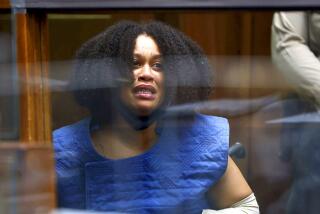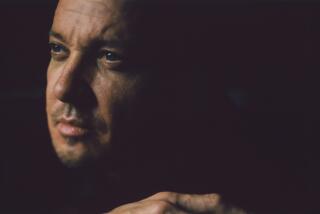Personal Tragedy Puts Hospital Administrator on a New Path : Disabilities: Nancy Nightingale hopes to create a role that will lead to improved catastrophic assistance for patients and their families.
- Share via
“It’s a mother’s nightmare. I always thought that if something happened to one of my kids, it would crack me up,” said Nancy Nightingale, hospital administrator at the 321-bed Kaiser Permanente Hospital in Panorama City.
Something did happen--the Wednesday afternoon before Thanksgiving five years ago, when Nightingale’s only daughter, Jennifer, was driving home from Cal Poly San Luis Obispo, where she was studying architecture.
“I remember the feel of the day,” the 46-year-old Nightingale said. “It was clear and breezy, with a sense of excitement in the air. I was so happy about Thanksgiving, and seeing Jennifer, and we were going to go see ‘Cats’ on Friday to celebrate her 20th birthday.”
But the phone was ringing as Nightingale walked into her condominium with her youngest son, Mike, 21. It was Cottage Hospital in Santa Barbara: Her daughter had been in a car accident, and she was in critical condition.
Nightingale remembers how the neurosurgeon went through the list of injuries on the telephone, the fractured pelvis and ribs, the diffuse brain injury with brain stem involvement, the internal bleeding, the respirator. Nightingale remembers that the physicians didn’t think Jennifer would make it through the night.
“I didn’t know if I’d have the courage to see her,” Nightingale said. “And when I did, there was blood and glass still on her face; she was so fragile they didn’t dare clean her up.”
For three months, Jennifer was in a coma, and Nightingale spent days and nights by her side, reading to her, talking to her, telling her to just try to hear her mother and to understand. She walked the city of Santa Barbara, talking into a tape recorder, recording her comments on the sights and sounds of the street, the kids running in the park, the weather--and then she played the tapes to Jennifer in the hospital.
Slowly, Jennifer got better. When she finally came home she had to learn to crawl, to walk, to write. Today, at 24, she lives in an apartment with a roommate and takes two classes at Pasadena City College. She is physically disabled and has problems with her short-term memory, but said Nightingale, she’s doing well.
Jennifer’s accident was the start of a new phase in Nightingale’s life, an experience that she said has given her unusual insight into the plight of families involved in catastrophic illness.
“The daughter I knew is not still alive,” Nightingale said. “I have a new daughter.”
Jennifer today has different needs, different goals and a different future, Nightingale said. And, she said, families who experience such tragedy need to know that they must grieve for the person they knew and loved before they can fully accept the changes, challenges and disabilities that may be associated with survival.
As a hospital administrator and registered nurse, Nightingale is determined to do something to help others deal better with hospitals, health care providers and tragedy.
After 15 1/2 years in the Kaiser system as a nurse and staff development instructor, and 5 1/2 years as hospital administrator, Nightingale is leaving her job this month.
She saved vacation time and socked away savings for a six-month leave of absence, during which she hopes to create a role--perhaps a combination of putting her thoughts in writing and speaking to health professionals, she said--that will improve the quality of catastrophic care given to patients and their families.
She is giving up a job that few women have, a career that she worked hard to achieve. According to the Hospital Council of Southern California, there are only 14 women hospital administrators in the 167 hospitals in Los Angeles County.
Nightingale was a candy-striper in Upland and Chino when she was in high school, and she graduated from Chaffey Community College at 19. Married soon afterward, she wanted to expand her horizons, and entered Cal State Los Angeles. She became pregnant; after giving birth to a son, Patrick, now 26, a month early, she studied for finals sitting on the floor with him in her lap.
After separating from her husband, Nightingale went to work at Kaiser Permanente Hospital in Fontana. With four children now--including Matthew, now 22--she took care of them during the day and worked an 8 p.m. to midnight shift at the hospital.
She moved up to in-service teaching and eventually was assigned a special project in administration when an assistant hospital administrator left. Nightingale liked it so much she decided to get a degree in hospital administration.
In her early 30s, broke and now divorced, she got a bachelor’s degree in nursing while working four nights a week. Although she had no money for graduate school, she talked her way into Loma Linda University, signing a series of notes and loans until she qualified for a scholarship. For the year and a half she was in graduate school, she continued to work as an assistant in hospital administration, studying and caring for the household of children in between.
“I never learned how to keep everything separate,” she said, explaining that she sees the work force differently as a result of her long juggling act as a single working parent going to school.
Nightingale’s success through tough times has also given her high expectations for others. “Necessity caused me to stretch, but I learned we can all do far more than we even think we can do,” she said.
Judging by comments from colleagues at Kaiser in Panorama City--who call her “wonderful”--her style is effective. For example, Tracy Schmidt, an assistant administrator there, said one of Nightingale’s strengths is that “she’s willing to take risks with people.”
That same desire to stretch, Nightingale said, is why she’s leaving Kaiser. She said her combination of circumstances--being a nurse, a hospital administrator and part of a family that has suffered catastrophic injury--is so unusual that she feels compelled to do something with it.
She said the health-care establishment ignores a family’s greatest area of expertise--its intimate knowledge of the patient. Doctors and nurses will be with the patients for weeks or months, but family members, she said, will be with them for the rest of their lives.
She wants to promote greater respect for families’ input and encourage their involvement in health care, and believes hospitals should equip families to support patients from the moment they are admitted to a hospital. “I was the one with the lifetime commitment to Jennifer,” she said, “not the doctors and the nurses.”
Last summer, Nightingale was forced to deal with tragedy again. Mike, now 21, who was with her when she learned of Jennifer’s accident, fell from a three-story building while he was posted in the Aleutian Islands with the U.S. Coast Guard. His back was seriously injured, and Nightingale flew to Anchorage to see him.
“I was very angry that I had to sit in another ICU. I was angry that I knew what to do, what to bring, whom to call, because I had done it all before,” Nightingale said. Mike has recovered--he can walk--but he is also disabled.
She has gotten married again, to Arthur Roscoe, 53, whom she met while Jennifer was still in a coma, and married about 13 months after her daughter’s accident. They live in Porter Ranch; he works for Unisys International, selling large computer systems.
Nightingale and Jennifer never used those two tickets to “Cats” the Friday after Jennifer’s accident. But a year later, Nightingale, Jennifer and Roscoe sat down together to see the show. Jennifer, just relearning to talk, was thrilled to be there. In the middle of a song, Nightingale stopped and stared at Jennifer in disbelief. Jennifer was singing the words to the song, words she had heard before the accident, that no one thought she would ever sing again.
Nightingale said Jennifer noticed her mother was staring at her. “Am I bothering you?” she said.
Nightingale replied, “No, no, you’re not.”
More to Read
Sign up for Essential California
The most important California stories and recommendations in your inbox every morning.
You may occasionally receive promotional content from the Los Angeles Times.













